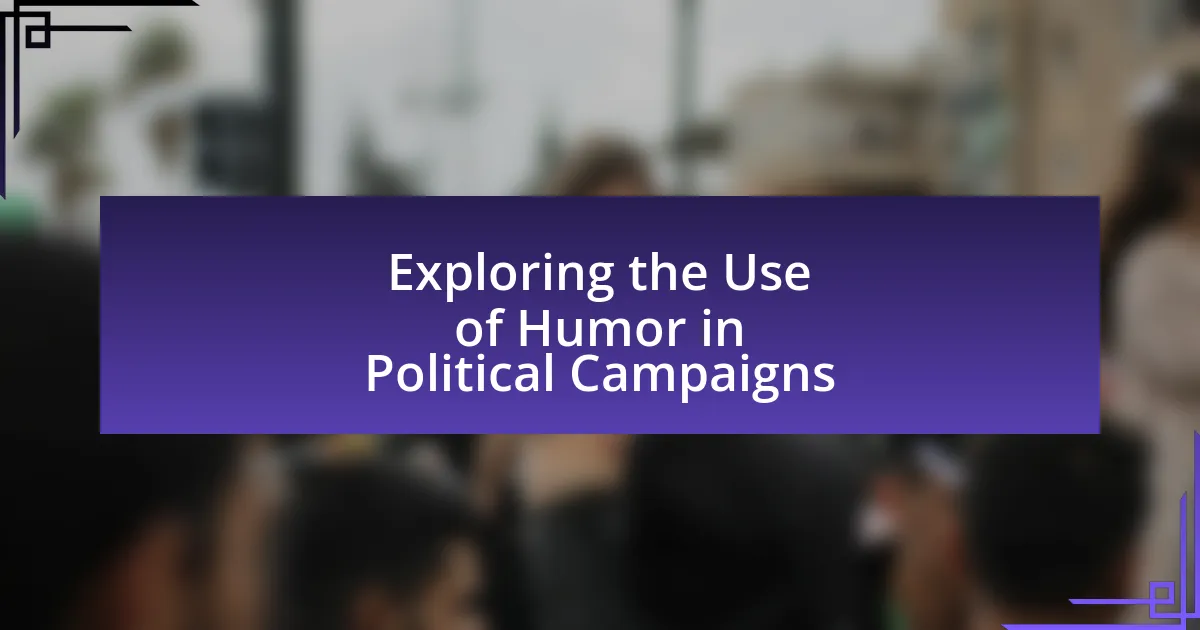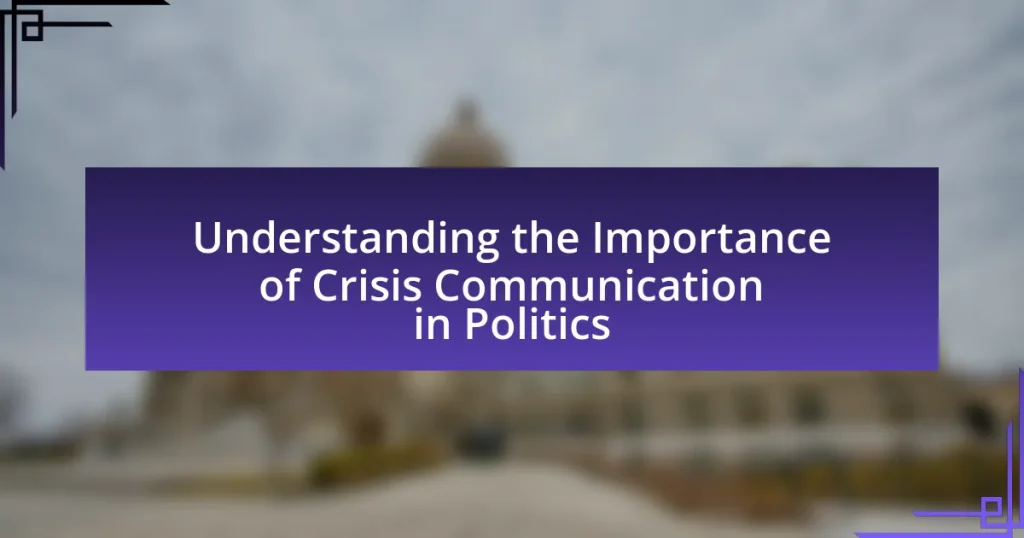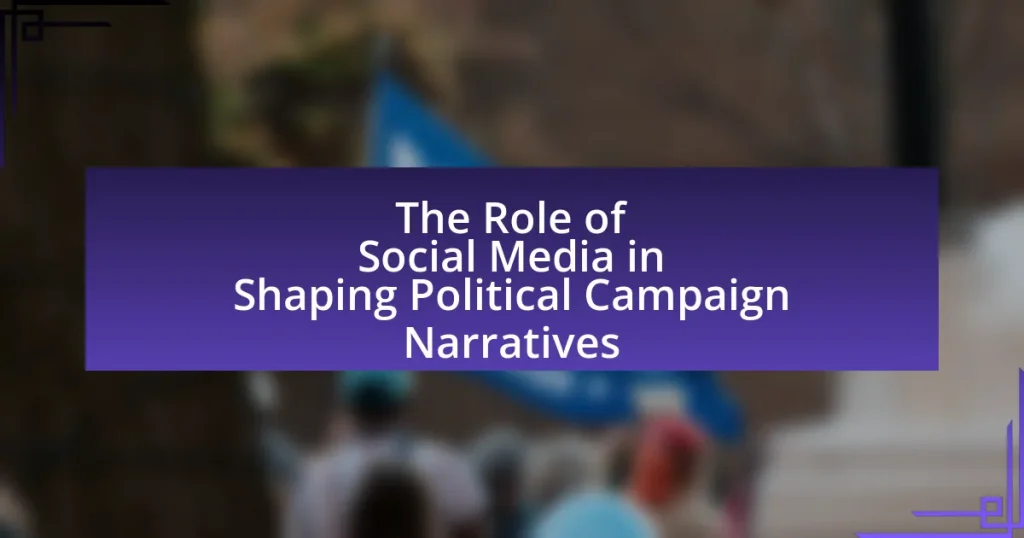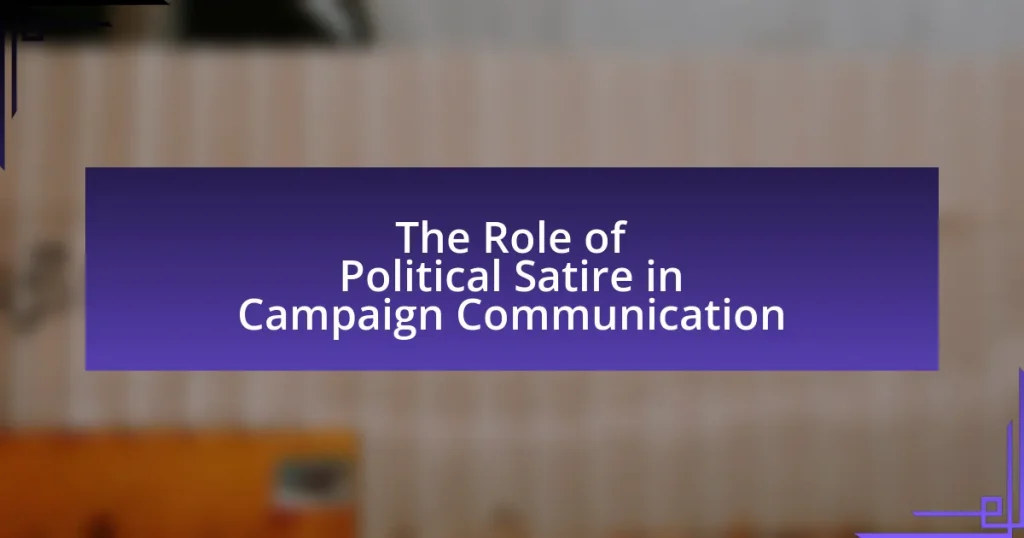The article explores the role of humor in political campaigns, highlighting its significance in enhancing voter engagement and relatability. It examines historical uses of humor, notable examples from past campaigns, and the psychological effects humor has on audiences, including increased message retention and positive emotional responses. The article also discusses the various types of humor employed in political messaging, the cultural contexts that influence its effectiveness, and the potential risks and challenges candidates face when using humor. Additionally, it outlines best practices for incorporating humor into campaigns and methods for measuring its impact on voter perception and engagement.
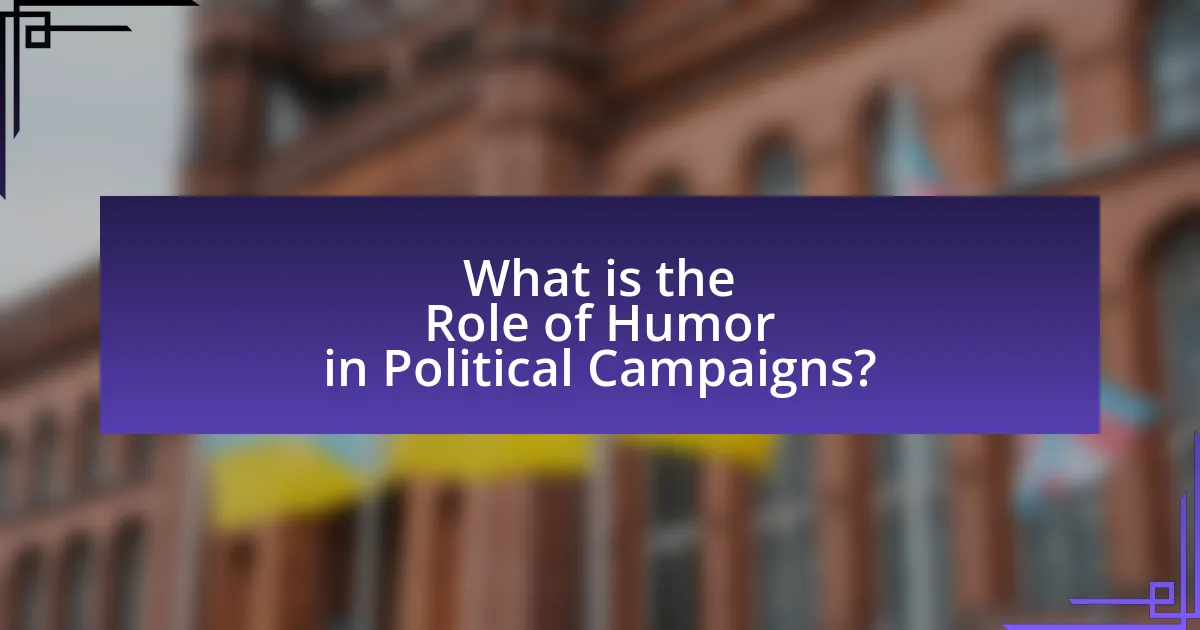
What is the Role of Humor in Political Campaigns?
Humor plays a significant role in political campaigns by enhancing relatability and engagement with voters. It serves as a tool for candidates to connect with the electorate, making their messages more memorable and approachable. For instance, studies have shown that humor can increase audience retention of political messages, as seen in the use of comedic sketches on platforms like Saturday Night Live, which often influence public perception and voter behavior. Additionally, humor can diffuse tension around controversial issues, allowing candidates to address sensitive topics in a more palatable manner. This strategic use of humor has been evidenced in various campaigns, such as Barack Obama’s use of humor during his 2008 campaign, which helped him resonate with younger voters and build a positive image.
How has humor been historically used in political campaigns?
Humor has historically been used in political campaigns as a tool to engage voters, simplify complex issues, and disarm opponents. For instance, during the 1960 presidential campaign, John F. Kennedy effectively utilized humor in his speeches and television appearances to connect with the public and present himself as relatable. Additionally, political cartoons have been a longstanding medium for humor, with figures like Thomas Nast using satire in the 19th century to critique political corruption and influence public opinion. This strategic use of humor not only entertains but also serves to humanize candidates and make political discourse more accessible to the electorate.
What are some notable examples of humor in past political campaigns?
Notable examples of humor in past political campaigns include Ronald Reagan’s use of one-liners during the 1984 presidential campaign, such as his quip, “I am not going to exploit, for political purposes, my opponent’s youth and inexperience,” which effectively showcased his wit while addressing his opponent, Walter Mondale. Additionally, the 2008 campaign featured Barack Obama’s humorous self-deprecation in his appearances on “Saturday Night Live,” where he joked about his own campaign’s challenges, enhancing his relatability. These instances illustrate how humor can be strategically employed to engage voters and create memorable moments in political discourse.
How did these examples impact voter perception?
Humor in political campaigns significantly influenced voter perception by making candidates appear more relatable and approachable. For instance, studies have shown that humorous advertisements can increase a candidate’s likability, leading to higher voter engagement and support. A notable example is the use of comedic sketches by candidates during debates, which often resulted in a more favorable public image and increased media coverage. This effect is supported by research from the Pew Research Center, which found that voters are more likely to remember candidates who effectively use humor, thereby enhancing their overall appeal in the electoral process.
Why is humor considered an effective tool in political messaging?
Humor is considered an effective tool in political messaging because it enhances engagement and relatability, making complex political issues more accessible to the public. Research indicates that humor can increase message retention and create a positive emotional response, which can lead to greater support for political candidates. For instance, a study published in the journal “Political Psychology” by researchers at the University of California found that humorous political ads were more likely to be remembered and shared among viewers compared to serious ads. This demonstrates that humor not only captures attention but also fosters a connection between the audience and the political message, ultimately influencing public opinion and voter behavior.
What psychological effects does humor have on audiences?
Humor has significant psychological effects on audiences, primarily by enhancing mood, increasing engagement, and fostering social connections. Research indicates that humor activates the brain’s reward system, releasing dopamine, which contributes to feelings of pleasure and happiness. This positive emotional state can lead to increased receptiveness to messages, making audiences more likely to accept and remember information presented humorously. Additionally, humor can reduce anxiety and defensiveness, creating a more open environment for discussion and persuasion. Studies, such as those conducted by Robert M. Kowalski in “The Psychology of Humor: An Integrative Approach,” demonstrate that humor can also strengthen group cohesion and facilitate social bonding, which is particularly beneficial in political contexts where audience alignment is crucial.
How does humor influence political engagement and participation?
Humor significantly enhances political engagement and participation by making political discourse more accessible and relatable. When humor is used in political campaigns, it can break down complex issues, making them easier for the public to understand and discuss. For instance, studies have shown that humorous content can increase viewers’ interest in political topics, leading to higher levels of engagement. Research by the Pew Research Center indicates that individuals exposed to political humor are more likely to participate in discussions and share political content on social media, thereby amplifying their involvement in the political process. Additionally, humor can foster a sense of community among individuals who share similar political views, further motivating them to engage in political activities.
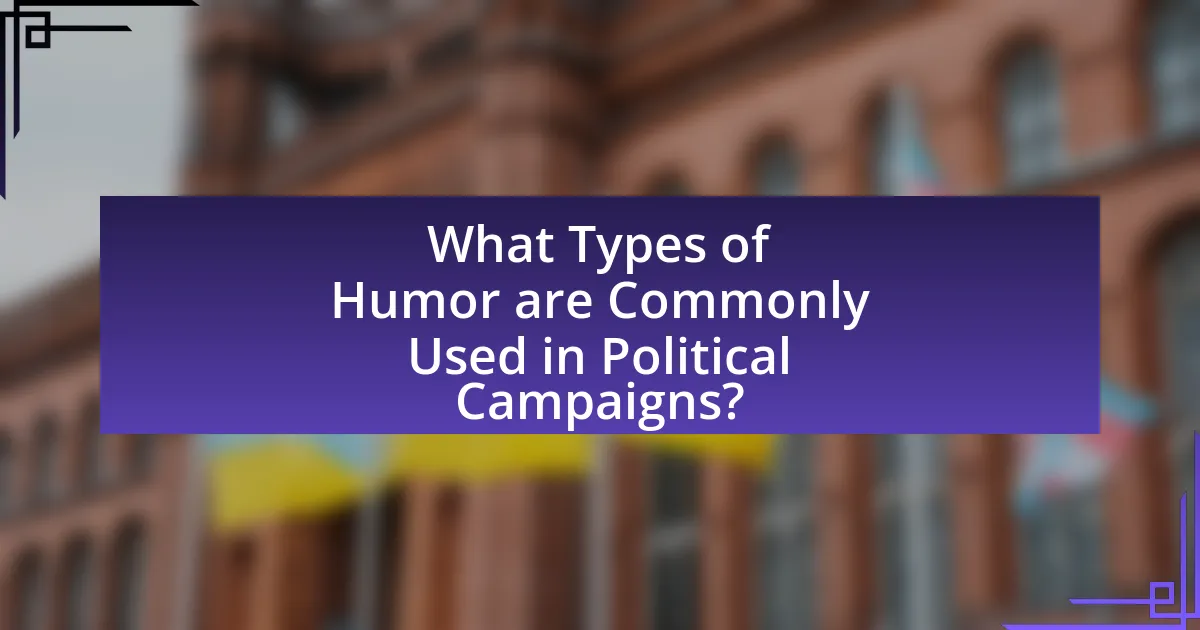
What Types of Humor are Commonly Used in Political Campaigns?
Political campaigns commonly utilize satire, parody, and self-deprecating humor. Satire targets political opponents or policies, often exaggerating flaws to provoke thought or laughter, as seen in shows like “Saturday Night Live.” Parody mimics the style of opponents or political events to highlight absurdities, effectively engaging audiences. Self-deprecating humor allows candidates to appear relatable and human, which can foster voter connection. Research indicates that humor can enhance message retention and increase voter engagement, making it a strategic tool in political communication.
What are the different forms of humor utilized in political messaging?
Political messaging employs various forms of humor, including satire, parody, irony, and absurdity. Satire critiques political figures or policies through exaggeration and wit, often highlighting flaws or contradictions, as seen in shows like “Saturday Night Live.” Parody mimics the style of political opponents or media to create comedic effect, effectively undermining their credibility. Irony presents situations where the outcome is contrary to what is expected, often revealing hypocrisy in political discourse. Absurdity uses illogical or nonsensical elements to provoke laughter while drawing attention to serious issues, exemplified by the works of comedians like John Oliver. These forms of humor serve to engage audiences, simplify complex issues, and foster critical thinking about political matters.
How do satire and parody differ in their application to political campaigns?
Satire and parody differ in their application to political campaigns primarily in their intent and execution. Satire aims to critique and expose the flaws or absurdities of political figures or policies through humor, often encouraging critical thinking and social change, as seen in programs like “Saturday Night Live” which highlight political missteps. In contrast, parody imitates the style or content of political figures or campaigns for comedic effect, often without the intent to critique, such as in the “Weird Al” Yankovic songs that mimic political speeches for entertainment rather than commentary. This distinction is crucial as satire engages audiences in a dialogue about political issues, while parody primarily seeks to amuse.
What role does irony play in political humor?
Irony serves as a critical tool in political humor by highlighting contradictions between political rhetoric and reality. This form of humor allows comedians and satirists to expose the absurdities and failures of political figures, making complex issues more accessible and engaging for the audience. For instance, shows like “Saturday Night Live” often use irony to critique political decisions, effectively illustrating the gap between promises made by politicians and the outcomes of their policies. This technique not only entertains but also encourages critical thinking among viewers, prompting them to question the status quo and engage in political discourse.
How do cultural contexts affect the use of humor in political campaigns?
Cultural contexts significantly influence the use of humor in political campaigns by shaping what is considered acceptable, relatable, and effective in communication. For instance, in cultures with a high context communication style, humor may rely heavily on shared experiences and implicit understanding, making it more effective when it resonates with local traditions or social norms. Conversely, in low context cultures, humor may be more direct and explicit, often using satire or irony to critique political opponents. Research by the Pew Research Center indicates that humor can enhance relatability and engagement, but its effectiveness varies widely across different cultural backgrounds, as humor that is well-received in one culture may be misunderstood or deemed offensive in another.
What are the challenges of using humor in diverse cultural settings?
Using humor in diverse cultural settings presents challenges such as varying interpretations of jokes, cultural sensitivities, and differing social norms. For instance, a joke that is humorous in one culture may be offensive in another due to differing values or historical contexts. Research indicates that humor often relies on shared knowledge and experiences, which can lead to misunderstandings when audiences lack common cultural references. Additionally, humor can inadvertently reinforce stereotypes or alienate certain groups, making it crucial for communicators to be aware of their audience’s cultural backgrounds to avoid miscommunication and backlash.
How can humor be tailored to resonate with specific demographics?
Humor can be tailored to resonate with specific demographics by understanding their cultural references, values, and social contexts. For instance, political campaigns that target younger voters often utilize memes and social media trends that reflect contemporary issues and humor styles relevant to that age group. Research indicates that humor that aligns with the audience’s experiences and beliefs increases relatability and engagement, as seen in the 2020 U.S. presidential campaign where candidates used humor to address issues like climate change and social justice, effectively connecting with younger voters.
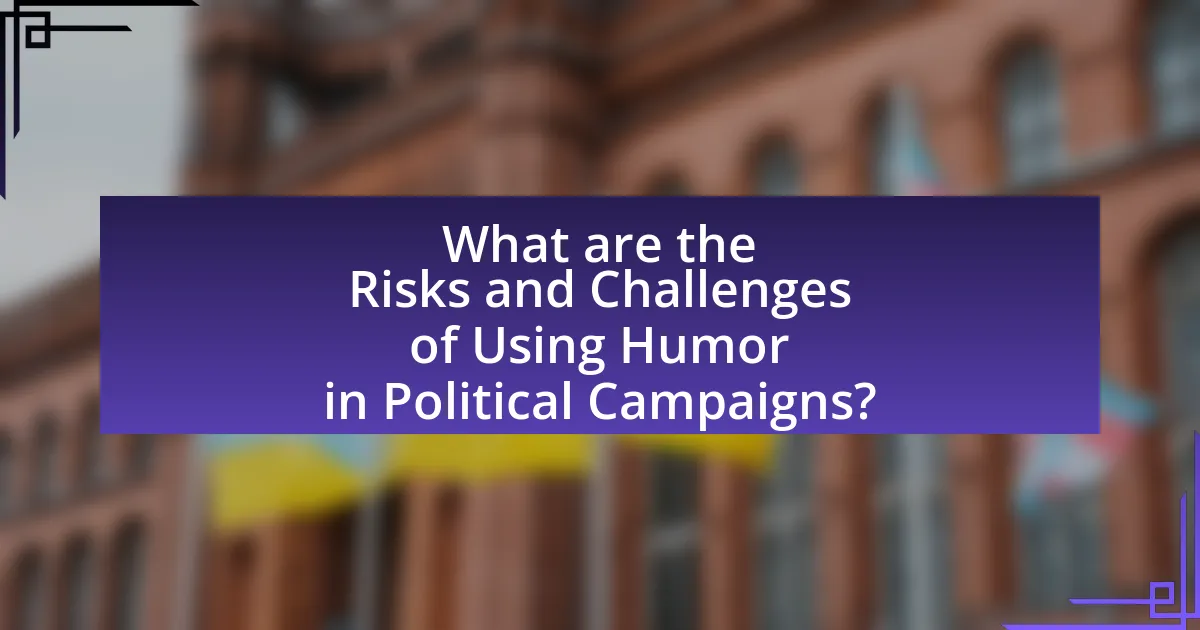
What are the Risks and Challenges of Using Humor in Political Campaigns?
Using humor in political campaigns carries significant risks and challenges, primarily the potential for misinterpretation and alienation of voters. Humor can easily be perceived as offensive or inappropriate, leading to backlash against the candidate. For instance, a study by the Pew Research Center found that 70% of respondents felt that humor in politics can sometimes cross the line into insensitivity. Additionally, humor may not resonate with all demographics, risking the alienation of key voter groups. This was evident in the 2016 U.S. presidential election, where humorous remarks by candidates were often divisive, polarizing their support base. Therefore, while humor can engage and entertain, it poses substantial risks that can undermine a campaign’s effectiveness.
What potential pitfalls should political candidates be aware of when using humor?
Political candidates should be aware that humor can alienate certain voter demographics. When humor is misinterpreted or deemed offensive, it can lead to backlash, damaging a candidate’s reputation and credibility. For instance, a study by the Pew Research Center found that 62% of respondents felt that humor in political discourse can sometimes cross the line into insensitivity. Additionally, humor that relies on stereotypes can reinforce negative perceptions and create divisions among constituents. Therefore, candidates must carefully consider their audience and the context of their humor to avoid these pitfalls.
How can humor backfire and negatively impact a campaign?
Humor can backfire and negatively impact a campaign by alienating certain voter demographics or trivializing serious issues. When humor is perceived as offensive or inappropriate, it can lead to backlash, damaging the candidate’s reputation and credibility. For instance, a study by the Pew Research Center found that 60% of respondents felt that humor in political ads could be off-putting if it seemed disrespectful or insensitive. This indicates that while humor can engage some audiences, it risks alienating others, ultimately undermining the campaign’s effectiveness.
What are the ethical considerations surrounding humor in political discourse?
The ethical considerations surrounding humor in political discourse include the potential for misinformation, the reinforcement of stereotypes, and the impact on public perception. Humor can distort facts, leading to misunderstandings about political issues, as seen in satirical news that may blur the line between entertainment and reality. Additionally, humor can perpetuate harmful stereotypes, marginalizing certain groups while favoring others, which raises concerns about inclusivity and respect. Furthermore, the use of humor can shape public perception, influencing voter attitudes and behaviors, sometimes in ways that undermine informed decision-making. These factors highlight the need for careful consideration of the implications of humor in political contexts.
How can candidates effectively measure the impact of humor in their campaigns?
Candidates can effectively measure the impact of humor in their campaigns by utilizing audience feedback, engagement metrics, and polling data. Audience feedback can be gathered through surveys and focus groups that specifically assess reactions to humorous content, allowing candidates to understand how humor resonates with voters. Engagement metrics, such as likes, shares, and comments on social media platforms, provide quantitative data on how well humorous messages are received and can indicate overall effectiveness. Additionally, polling data can reveal shifts in voter sentiment before and after humorous campaign materials are released, demonstrating any correlation between humor and voter support. For instance, a study by the Pew Research Center found that humor in political messaging can significantly enhance relatability and voter engagement, underscoring the importance of measuring its impact.
What tools and methods are available for assessing audience reactions to humorous content?
Tools and methods for assessing audience reactions to humorous content include surveys, focus groups, social media analytics, and physiological measures. Surveys can quantify audience responses through structured questions, while focus groups provide qualitative insights into audience perceptions and interpretations of humor. Social media analytics track engagement metrics such as likes, shares, and comments to gauge audience reactions in real-time. Physiological measures, such as eye tracking and facial expression analysis, offer objective data on emotional responses to humorous content. These methods collectively enable researchers and campaigners to understand the effectiveness of humor in engaging audiences during political campaigns.
How can feedback be used to refine humor strategies in political messaging?
Feedback can be used to refine humor strategies in political messaging by analyzing audience reactions to comedic content. Political campaigns can gather data through surveys, social media engagement metrics, and focus groups to assess which humorous elements resonate with voters. For instance, a study by the Pew Research Center found that humor can significantly influence public perception, indicating that effective humor can enhance relatability and engagement. By continuously iterating on humor based on this feedback, campaigns can tailor their messaging to better align with audience preferences, ultimately improving their overall effectiveness in communication.
What Best Practices Should Candidates Follow When Incorporating Humor?
Candidates should ensure that humor is relevant, appropriate, and resonates with their audience when incorporating it into their campaigns. Relevance ensures that the humor aligns with the campaign message and the issues at hand, while appropriateness guarantees that it does not offend or alienate any demographic. For instance, a study by the Pew Research Center found that humor can enhance relatability and engagement, but it must be carefully tailored to the audience’s values and sensibilities. Additionally, candidates should practice self-deprecating humor, as it can humanize them and make them more relatable, as evidenced by successful political figures who have effectively used this technique to connect with voters.
